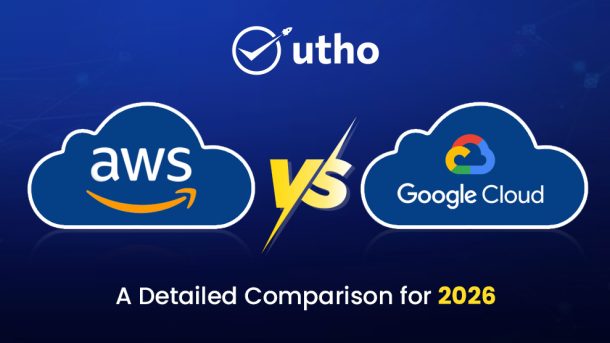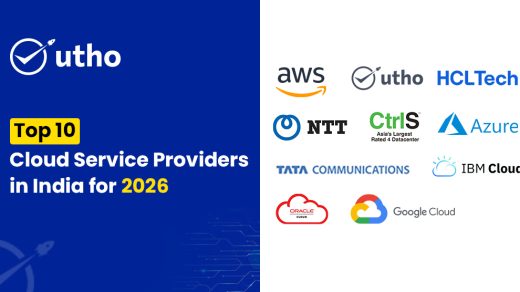Both platforms offer a similar range of services, but their execution and focus vary. AWS has more tools and enterprise solutions. GCP excels in AI/ML and data innovations.
Data Centre Coverage
- AWS: AWS has 30+ regions and 99 Availability Zones. This ensures global redundancy, low latency, and compliance for multinationals. AWS also has local zones to support edge computing use cases.
- Google Cloud: GCP has a global presence, with 35+ regions. It is investing in new zones. Google Cloud's private global fibre network is fast and reliable. It has low latency and minimal downtime.
For businesses with global users, both AWS and GCP offer strong infrastructure. But AWS has a slight edge due to its wider global footprint.
Introducing Utho: an affordable cloud alternative.
AWS and Google Cloud Platform (GCP) are industry giants. They offer unmatched cloud services. However, many businesses face challenges. These include high costs, complex pricing, and a steep learning curve. These factors can be overwhelming, especially for startups and SMEs. They're often cost-conscious, too.
This is where Utho steps in. It's a game-changing, low-cost cloud alternative. It provides reliable, efficient, and cheap cloud solutions. And it avoids the complexity of traditional hyperscalers.
Why Utho stands out.
1. 60% cost reduction
One of Utho’s most compelling benefits is its ability to reduce cloud costs by up to 60%.
- AWS and GCP have complex pricing and require long-term contracts. Utho has simple, low-cost pricing that makes it easy to manage cloud costs.
- Utho delivers the same performance, scalability, and reliability. But it costs much less. This lets businesses invest the savings in growth, innovation, or other key projects.
Utho has saved users a lot on compute and storage. Its bandwidth-heavy workloads are cheaper than AWS and GCP.
2. Free and hassle-free migration
Migrating workloads to the cloud is often seen as time-consuming, costly, and disruptive. Utho eliminates these challenges with its free, direct migration service that ensures:
- A smooth transition of applications, databases, and storage without disruption.
- Expert support throughout the migration process to minimise downtime and technical roadblocks.
- Migrating in 30 days will help businesses cut costs and boost performance.
Utho's free migration is valuable for businesses. It helps them switch from costly hyperscalers like AWS or GCP. It adds no complexity.
3. Seamless User Experience
At Utho, simplicity and performance go hand in hand. Utho's user-friendly, optimised infrastructure delivers a seamless experience. Whether you're a startup wanting to deploy apps on time, or an enterprise with heavy workloads.
- Easy-to-Use Console: Utho’s dashboard is intuitive. It makes it easy to deploy, scale, and manage resources. This is true even for teams with limited cloud skills.
- Performance-Optimised Services: Utho's tech is cutting-edge. It guarantees high availability, fast deployments, and top performance for critical workloads.
- Tailored Solutions: Utho provides custom solutions for startups, SMEs, and enterprises. We ensure each business gets the right mix of scalability, reliability, and low costs.
Utho’s Innovative Cloud Solutions
Utho isn’t just another cloud provider; it’s a platform designed to help businesses:
- Optimize costs without sacrificing performance.
- Simplify cloud management with an easy-to-use interface.
- Leverage enterprise-grade infrastructure at a fraction of the cost.
Utho is the answer. It will help you migrate workloads, scale apps, or find a cloud partner to fuel your growth. It offers the perfect mix of low cost, reliability, and innovation.
Explore Utho today.
In a world of hyperscalers, Utho is a standout. It is an affordable, no-compromise solution for modern cloud infrastructure.
- Save up to 60% on costs.
- Enjoy free migration within 30 days.
- Experience a seamless and optimised cloud environment.
Learn how Utho can transform your cloud journey. It can deliver unmatched cost savings and performance!
The decision between AWS vs Google Cloud depends on your organisation's needs. These include service offerings, pricing, performance, and long-term goals.
- AWS is the global leader. It has a vast suite of services, a robust infrastructure, and unmatched scalability. It is ideal for firms that need top solutions and global reach. They also need flexibility for large workloads.
- Google Cloud excels in data analytics, AI/ML, and open-source integration. Businesses that focus on innovation and real-time insights often prefer GCP. It aligns better with their goals for modern app development.
However, for organisations wanting an affordable, reliable, and easy-to-use option, Utho is a great choice.
- Achieve up to 60% cost reduction in cloud expenses.
- Benefit from free migration within just 30 days for a seamless transition.
- Leverage an intuitive, performance-optimised infrastructure tailored for startups, SMEs, and enterprises alike.
By analysing the strengths of AWS, Google Cloud, and new options like Utho, you can make an informed choice. Align their strengths with your business priorities. This will deliver scalability, cost efficiency, and innovation.
In the fast-changing cloud world of 2026, the right platform will boost your business. It will also keep you competitive, agile, and ready for the future.
Key aspects covered in this comparison
This blog post will help you decide. It will analyse AWS vs Google Cloud on several key points.
- AWS and Google Cloud: A brief look at their strengths, history, and market position.
- Service Comparison: A side-by-side look at AWS and Google Cloud's services. It covers compute, storage, networking, AI/ML, and security.
- Data Centre Coverage: Their global infrastructure ensures reliability and low latency. It meets regional regulations too.
- Pricing and Cost Efficiency: A comparison of their pricing structures. It should include pay-as-you-go models, discounts, and tools to optimise spending.
- Performance and Reliability: An assessment of uptime, latency, and SLAs.
- Security and Compliance: AWS and Google Cloud's data protection and global standards.
- Best Use Cases for Each: When to choose AWS and when to opt for Google Cloud based on your business needs.
- Introducing Utho: An Affordable Cloud Alternative. For businesses seeking cheap, easy, and reliable cloud solutions, we will introduce Utho. It's a platform that cuts costs while providing top performance and support.
Overview of AWS and Google Cloud
In the fast-changing world of cloud computing, AWS and GCP are key players. They are driving innovation and enabling digital transformation in businesses of all sizes. Both platforms offer many services. Yet, their approaches, architectures, and audiences differ.
Amazon Web Services (AWS)
Launched in 2006, AWS has been the pioneer of modern cloud computing. As one of the first major cloud providers, AWS changed the industry. It offered scalable, pay-as-you-go infrastructure. This has become the foundation of many organisations worldwide.
Key Highlights of AWS:
- AWS has 200+ fully featured services. They span compute, storage, networking, databases, analytics, AI/ML, and security. Its extensive offering makes it suitable for startups, SMEs, and large enterprises.
- Global Reach: AWS operates in 30+ regions and 99 Availability Zones. It plans to expand further. Its global footprint ensures high availability and low-latency performance for customers everywhere. It also provides redundancy.
- Enterprise-Grade Infrastructure: Major firms, like Netflix, Airbnb, and NASA, trust AWS's mature infrastructure. This proves its reliability and scalability.
- AWS is a leader in tech like AI/ML, serverless (AWS Lambda), IoT, and edge computing.
Why AWS Stands Out:
- Flexibility and Scalability: AWS lets businesses adjust resources to meet demand. There are no long-term commitments.
- Tool Variety: The platform supports many third-party tools and integrations.
- Global Customer Base: AWS's early mover advantage has made it the go-to platform for global enterprises. It is the top choice for complex, large-scale workloads.
AWS is often preferred for its global scalability, enterprise-grade infrastructure, and vast services.
Google Cloud Platform (GCP)
Launched in 2008, Google Cloud Platform builds on Google's top skills in search, ads, and big data. GCP, with its focus on innovation, appeals to data-driven firms. It is for those seeking modern development tools.
Key Highlights of Google Cloud:
- AI and Data Analytics Leadership: GCP leads in AI/ML services. It uses Google's internal work to offer tools for data-focused businesses. They are the AI Platform, BigQuery, Dialogflow, and Vision AI.
- Open-Source Compatibility: Google Cloud supports open-source tech like Kubernetes, TensorFlow, and Apache Beam. Developers and cloud-native firms prefer it as their platform of choice.
- Modern Infrastructure: Google's fast, low-latency network, built for YouTube and Gmail.
- Global Data Centres: GCP operates in 35+ regions and is expanding its infrastructure. This ensures businesses benefit from compliance, data sovereignty, and proximity.
Why GCP Stands Out:
- Best-in-Class Data Tools: GCP's big data and ML tools are best for firms wanting AI insights.
- Developer-friendly: Google Cloud prioritises ease of use and flexibility. It provides tools for faster development, deployment, and management of cloud-native apps.
- Cost Efficiency: GCP has sustained-use discounts. They help businesses cut cloud costs as workloads grow.
Google Cloud is ideal for organisations prioritising AI and data analytics. It also integrates well with Google's ecosystem.
AWS vs Google Cloud: Service Comparison
AWS and Google Cloud provide a comprehensive suite of services across various categories. Here’s a detailed comparison:
| Category | AWS Services | Google Cloud Services |
| Compute | EC2: Virtual servers for scalable compute. | Compute Engine: Virtual machines for flexible compute. |
| Lambda: Serverless compute for event-driven workloads. | Cloud Functions: Serverless functions for event-driven tasks. | |
| Elastic Beanstalk: Managed platform for application deployment. | App Engine: Managed platform for building applications. | |
| Storage | Amazon S3: Object storage. | Cloud Storage: Scalable object storage. |
| EFS: Managed file storage for Linux workloads. | Persistent Disk: High-performance block storage. | |
| Glacier: Low-cost archival storage. | Archive Storage: Cost-efficient cold storage. | |
| Database | RDS: Managed relational databases. | Cloud SQL: Managed relational database. |
| DynamoDB: Serverless NoSQL. | Firestore: NoSQL document database. | |
| Redshift: Cloud data warehousing. | BigQuery: Serverless data warehouse for analytics. | |
| AI & ML | SageMaker: End-to-end ML model deployment. | AI Platform: Build and deploy ML models. |
| Rekognition: Image and video analysis. | Vision AI: Image analysis. | |
| Lex: Conversational AI. | Dialogflow: Conversational AI for chatbots. | |
| Networking | VPC: Virtual networks for cloud resources. | Virtual Private Cloud: Managed networking. |
| Route 53: Domain name services. | Cloud DNS: Scalable domain name resolution. | |
| CloudFront: Global CDN. | Cloud CDN: Low-latency content delivery. | |
| Security | IAM: Identity and access management. | Identity and Access Management: Unified access control. |
| GuardDuty: Threat detection. | Security Command Center: Threat prevention. | |
| WAF: Web application firewall. | Cloud Armor: Web-based protection. |
Both platforms offer a similar range of services, but their execution and focus vary. AWS has more tools and enterprise solutions. GCP excels in AI/ML and data-driven innovations.
Data Centre Coverage
- AWS: AWS has over 30 regions and 99 Availability Zones. This ensures global redundancy, low latency, and compliance for multinational organisations. AWS also has local zones to support edge computing use cases.
- Google Cloud: GCP has expanded globally, with 35+ regions and new zones in the works. Google Cloud's private global fibre network is fast and reliable. It has minimal downtime and low latency.
For businesses with global users, both AWS and GCP provide strong infrastructure. But, AWS has a slight edge due to its wider global footprint.
Introducing Utho: an affordable cloud alternative.
AWS and GCP are giants in cloud services. Yet, many businesses face challenges. These include high costs, complex pricing, and a steep learning curve. These factors can be overwhelming, especially for startups and SMEs. They're often on a tight budget.
This is where Utho steps in. It is a game-changing, affordable cloud alternative. It delivers reliable, efficient, and cost-effective cloud solutions. And it avoids the complexity of traditional hyperscalers.
Why Utho stands out.
1. 60% cost reduction
One of Utho’s most compelling benefits is its ability to reduce cloud costs by up to 60%.
- AWS and GCP require businesses to navigate complex pricing models. They also require commitments to reserved instances or long-term contracts. In contrast, Utho offers transparent, low-cost pricing. It makes it easier to predict and manage cloud costs.
- Utho rivals its competitors in performance, scalability, and reliability. But, it costs a fraction of their prices. It lets businesses invest the savings in growth, innovation, or other key initiatives.
Utho users say they save a lot over AWS and GCP for compute, storage, and bandwidth-heavy workloads.
2. Free and hassle-free migration
Migrating workloads to the cloud is often seen as time-consuming, costly, and disruptive. Utho eliminates these challenges with its free, direct migration service that ensures:
- A smooth transition of applications, databases, and storage without disruption.
- Expert support throughout the migration process to minimise downtime and technical roadblocks.
- Migrate within 30 days. This will let businesses save money and improve performance.
Utho's free migration is very valuable for businesses. They want to switch from costly hyperscalers like AWS or GCP. They seek to avoid added overhead or complexity.
3. Seamless User Experience
At Utho, simplicity and performance go hand in hand. Utho's fast, easy-to-use infrastructure provides a seamless experience. It's perfect for startups deploying apps quickly or enterprises with large workloads.
- Easy-to-Use Console: Utho's dashboard makes it easy to deploy, scale, and manage resources. It's perfect for teams with limited cloud expertise.
- Performance-Optimised Services: Utho uses cutting-edge tech. It guarantees high availability, fast deployments, and top performance for critical workloads.
Utho offers solutions for startups, SMEs, and enterprises. They meet each business's unique needs. Utho ensures a mix of scalability, reliability, and cost savings
Utho’s Innovative Cloud Solutions
Utho isn’t just another cloud provider; it’s a platform designed to help businesses:
- Optimize costs without sacrificing performance.
- Simplify cloud management with an easy-to-use interface.
- Leverage enterprise-grade infrastructure at a fraction of the cost.
Utho is the perfect cloud partner for your business growth. We are the right partner for you. We are affordable, reliable, and innovative. Whether you're migrating workloads, scaling apps, or something else.
Explore Utho today.
In a world of hyperscalers, Utho is a standout. It is an affordable, no-compromise solution for modern cloud infrastructure.
- Save up to 60% on costs.
- Enjoy free migration within 30 days.
- Experience a seamless and optimised cloud environment.
Learn how Utho can transform your cloud journey. It will save you money and boost performance! 🚀
The choice between AWS vs Google Cloud depends on your needs. Consider their services, prices, performance, and your long-term goals.
- AWS is the global leader. It has a vast suite of services, a strong infrastructure, and unmatched scalability.
It is ideal for firms that need:
-
- enterprise-grade solutions,
- global reach, and
- support for large workloads.
- Google Cloud excels in data analytics and AI/ML. It also integrates well with open-source tech. Innovative businesses often find GCP better for modern app development. They want real-time insights.
For organisations wanting a cheap, reliable, easy-to-use option, Utho is great.
- Achieve up to 60% cost reduction in cloud expenses.
- Benefit from free migration within just 30 days for a seamless transition.
Leverage an intuitive, performance-optimised infrastructure tailored for startups, SMEs, and enterprises alike.
By analysing the strengths of AWS, Google Cloud, and new options like Utho, you can make a smart choice. Align them with your business goals. It will provide scalability, cost-efficiency, and innovation.
In 2026's fast-changing cloud world, the right platform is key. It will boost your business and keep you competitive and agile.



